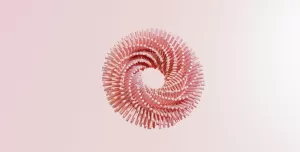What is Dissociation?
Understanding Dissociation, Types of Dissociative Disorders, Symptoms & Treatment
Understanding dissociation: types, symptoms, and causes
The definition of dissociate is “to disconnect or separate”. In the field of mental health this refers to the experience of feeling of detachment, disconnection, loss of contact, or separated from yourself or the world around you.
While dissociation is a complex phenomenon in the field of psychology it is also a concept that exists within a spectrum. That is, most people can relate to experiencing mild and occasional aspects of dissociation at times whereas others experience dissociative symptoms that are more substantial and longstanding.
This spectrum of experiences exists from the feeling of being on autopilot during your drive home from a stressful day, all the way to having major memory lapses, doing things out of character, and significant chunks of time missing.

At Mendable Psychology in our mental health clinic, mild experiences of dissociation are common and people often come to therapy without any previous knowledge of this concept. For the purpose of this article, we will focus on milder experiences of dissociation commonly seen as a symptom related to Post Traumatic Stress Disorder (PTSD) and complex or childhood trauma.
In this article, we will discuss
- What is dissociation
- Symptoms of dissociation
- Types of dissociative disorders
- Causes of dissociation
- Assessment and diagnosis of dissociative disorders
- Managing dissociation
Exploring dissociation: what is it and how it affects mental health
fragmentation of an individual’s thoughts, memories, emotions, actions, or identity. It often serves as a coping mechanism in response to trauma or overwhelming stress.
Symptoms of dissociation
“During these altered experiences the person is aware of reality and that their experience is unusual. The experience is very distressful, even though the person may appear to be unreactive or lacking emotion.”
Types of dissociation
Depersonalization/ derealization disorder involves significant ongoing or recurring experience of one or both conditions:
Depersonalization
Depersonalization can be described as the experience of feeling:
- separate or detached from yourself and your body
- outside of your body or watching events unfold from a distance
- like a stranger to yourself or that your body does not belong to you
- a sense of being on autopilot or robotic
Derealization
Derealization can be described as the experience of feeling:
- disconnected from the world around you
- your surroundings or the world are not real
- familiar people or places feel foreign or unfamiliar
- your surroundings feel foggy, distant, or disproportionate
Episodes of derealization may happen during flashbacks; you may suddenly feel much younger and feel your present environment is unreal during this time.
What causes dissociation and dissociative disorders
Mental health factors
Symptoms may begin in early childhood; the average age a person first experiences the disorder is 16. Less than 20 percent of people with depersonalization/derealization disorder first experience symptoms after age 20.
Trauma and past experiences
Dissociative symptoms and disorders can be related to traumatic events. Post Traumatic Stress Disorder and other trauma-related diagnosis can include dissociative symptoms.
Childhood trauma, and in particular, childhood emotional abuse and childhood emotional neglect are linked to the development of dissociative disorders.
Witnessing family violence, a parent with a serious mental health condition, and sudden loss are also found to be risk factors for the development of dissociation.
Other contributing factors
Drugs including cannabis, extacy, and ketamine can create dissociative symptoms and may be related t..
Diagnosis of dissociative disorders
Mindfulness and relaxation techniques are powerful tools for managing anxiety. Mindfulness involves bringing one’s attention to the present moment without judgment,
Diagnostic criteria
allowing individuals to detach from anxious thoughts about the past or future.
Seeking mental health professional assessment
Not sure where to start? There are many free and low-cost technology options available to
Managing dissociation: Effective therapies and self-care strategies
Evidence based therapy for dissociation and dissociative disorders
Most evidence-based mental health therapies include an education component where a focus includes learning about the disorder or condition. Learning about your specific dissociative symptoms and general mental health self-care is an important foundation to build further treatment from.
At the present time, research is still exploring our understandings of dissociation and the most effective approaches to treatment. Therapy can help to develop coping strategies to reduce or prevent dissociative symptoms. It may also focus on processing past traumatic events. The overarching goal of therapy is to integrate ones’ (dissociated) experiences to function as a unit rather than breaking off into parts.
Some therapy approaches that may be helpful in treating dissociative symptoms include cognitive behavioral therapy (CBT) and dialectical behavioral therapy (DBT).
Self-care strategies and coping with dissociative symptoms
One of the most important aspects of managing dissociative symptoms is helping yourself to develop a sense of safety and stability in daily life. If your environment includes regular experiences that are unsafe, your dissociation may actually be an important protective factor.
With an improved sense of (actual) safety, your body and mind can operate together and begin to learn to stay in the present moment.
Sensory grounding can be helpful in ‘grounding’ yourself within the present moment through engaging with your environment.
See our Mental Health Resources page for more coping strategy resources.
Conclusion and Resources
Resources
https://www.ptsd.va.gov/understand/what/ptsd_basics.asp
References
Traumadissociation.com (Jul 14, 2024). Dissociative Disorders. Retrieved Jul 14, 2024 from http://traumadissociation.com/dissociative.
https://www.psychiatry.org/patients-families/dissociative-disorders/what-are-dissociative-disorders
Disclaimer:
The information provided in this post and across this website does not, and is not intended to, constitute medical, mental health, or therapeutic advice; instead, all information, content, and materials available on this site are for general informational purposes only. This information does not create any therapeutic relationship and should not be used as a substitute for professional diagnosis and treatment. Consult with a licensed mental health provider for advice or support regarding diagnosis and treatment.
Psychologist in Edmonton | Contact Us
Mendable Psychology | Edmonton Psychologists | Mental Health Counselling
Office located in Mayfield West Edmonton
- (587) 415-0850
- 10458 Mayfield Rd NW, Edmonton, AB
- [email protected]
- Schedule online
Read more from our blog

Mental Health Spiral
Navigating a Mental Health Spiral How to cope with a downward spiral, tolerate distress, and reduce overwhelm Spiraling mental health? In mental health discussions, you

How Therapy Helps Mental Health
How Therapy Helps Mental Health Mental health counselling for prevention, support, coping, and treatment You may be wondering, “but how exactly does therapy help mental

Understanding Relationship Anxiety
Understanding Relationship Anxiety When Worry Gets in the Way of Connection Relationships can be a profound source of connection, love, and growth—but for some, they
